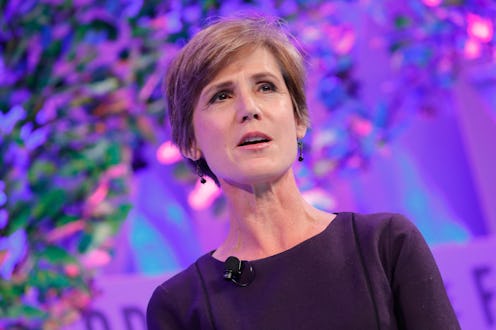News
Here's How Sally Yates Says You Can Stop An American Dictator

In the course of just one short year, former deputy attorney general Sally Yates went from being a relatively anonymous government official to a household name among many Democrats and progressives. On Monday, in a new essay for USA Today, Yates suggests that a dictatorship is what the United States is headed for — unless Americans start standing up for and telling the truth, regardless of their politics.
Thanks to Yates' high-profile firing by President Trump, which was many Americans' first introduction to her, she's become a somewhat celebrated figure among opponents of the president. Her USA Today op-ed, which is titled "Who are we as a country? Time to decide," makes the case that it's more important than ever to stand up for what she calls "objective truth," so as to work towards the goal of making the country "a more perfect union."
Yates' emergence into the national spotlight all started with her refusal to go through with Trump's hyper-controversial ban on immigration and refugees from several majority-Muslim countries, and her firing which followed in late January. She refused to implement the so-called "Muslim ban" on the grounds that it was likely unlawful. For a time, federal appeals courts seemed to agree with her and handed down multiple rulings against Trump's order. The Supreme Court recently ruled in support of the ban, however; still, legal challenges are ongoing.
Yates writes that the United States has periodically faced “inflection points” that demand people to take stock of the character of the nation, and consider “who we are." Citing the preamble to the U.S. Constitution ― which calls for the American people to work to create "a more perfect union" ― Yates argues that Americans must protect the country from creeping towards an autocratic dictatorship, and that standing up for truth and objectivity are crucial in that effort.
Specifically, she highlights the need for a sharp and concrete divide between the Justice Department and the executive branch. Without ever mentioning President Trump by name, it's pretty clear what she's talking about.
"This wall of separation is what ensures the public can have confidence that the criminal process is not being used as a sword to go after one’s political enemies or as a shield to protect those in power," she writes. "It’s what separates us from an autocracy."
The potential politicization of the Justice Department has been a major subject of scrutiny in recent months, owing to Trump's publicly shows of dissatisfaction with the investigation of special counsel Robert Mueller. Although the White House has denied that Trump has any intention of firing Mueller or attempting to halt his investigation, rumors to the contrary have reportedly been circulating on Capitol Hill.
Yates then arrives at her central argument, the plea that makes up the core of her piece: that it's imperative that citizens stand up for objective truth, because that's what truly separates a democracy from an autocracy.
"And there is something else that separates us from an autocracy, and that’s truth. There is such a thing as objective truth," Yates writes. "Not only is there such a thing as objective truth, failing to tell the truth matters. We can’t control whether our public servants lie to us. But we can control whether we hold them accountable for those lies or whether, in either a state of exhaustion or to protect our own political objectives, we look the other way and normalize an indifference to truth."
"So stand up. Speak out. Our country needs all of us to raise our collective voices in support of our democratic ideals and institutions. That is what we stand for. That is who we are," Yates writes. "And with a shared commitment to our founding principles, that is who we will remain."
Yates' solution, in other words, is to speak out with one voice in defense of America's democratic and civil institutions, and to do so loudly. You could make the case that's what she was doing when she refused to implement Trump's travel ban back in January, in fact ― putting a bedrock ideal above what she believed to be an unlawful order.